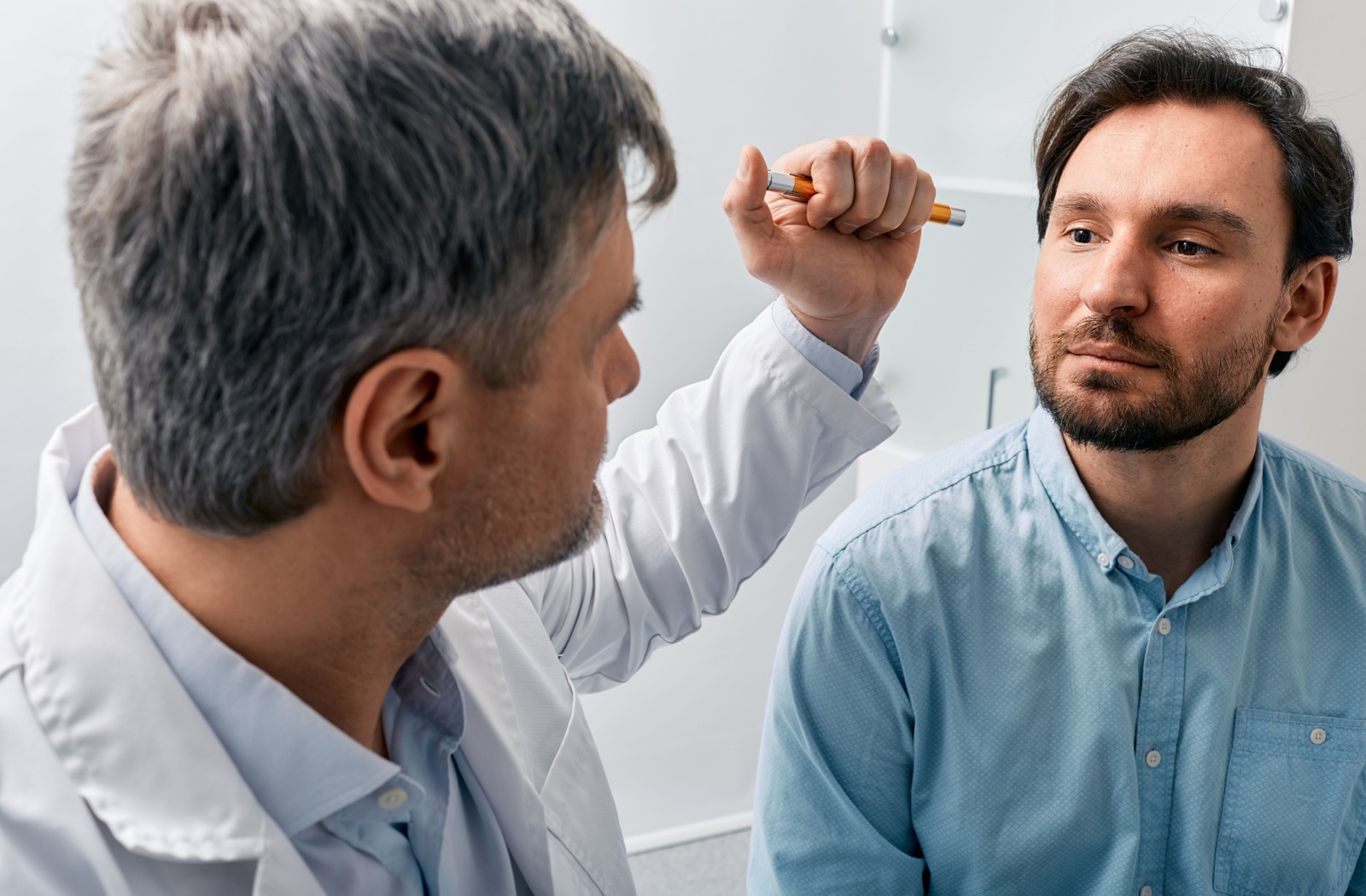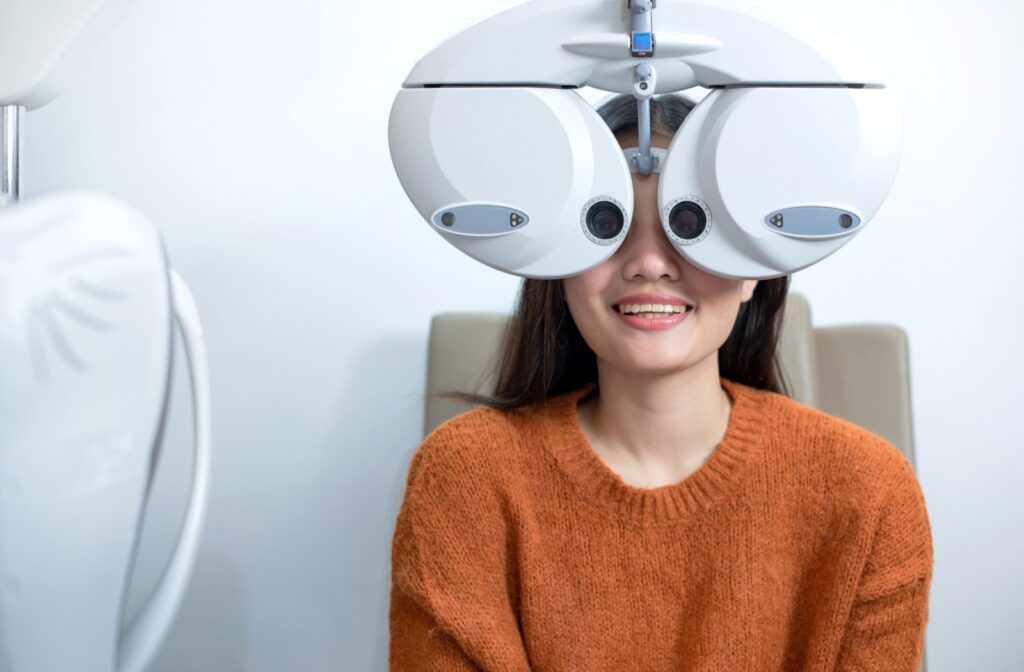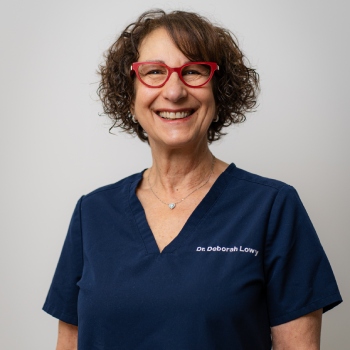Routine visits to your optometrist are key for maintaining good vision and ocular health.
In addition to comprehensive eye exams, additional eye exams include contact lens examinations and fittings, diabetic health checks, and glaucoma workups.
The focus of these exams differs based on the ocular concern your optometrist would like to assess. These exams generally range from 30 to 60 minutes.
Importance of Eye Exams
Regardless of an individual’s age, eye exams are important for maintaining good ocular health and vision. Eye exams go beyond monitoring changes in spectacle and contact lens prescriptions. They can help detect any eye conditions or general health conditions.
Some conditions can manifest in our bodies without individuals experiencing any symptoms or significant changes to their bodies or vision.
Eye exams serve as preventative measures to detect early signs of ocular conditions like:
- Age-related macular degeneration
- Cataracts
- Dry eye disease
- Glaucoma
Signs of general health conditions like diabetes, high blood pressure, cholesterol, and thyroid conditions can be seen in our eyes during health evaluations.
Early detection means timely management and treatment, which can improve the impact these ocular and general health conditions may have on our overall well-being.
Different Types of Eye Exams
Not all eye exams are created equal. There are several types of eye exams designed to focus on a particular area of ocular health.
While their purpose may differ, these appointments can take 30 to 60 minutes based on your eye health and the tests required for your ocular evaluation.
The frequency and length of these appointments depend on an individual’s age, family ocular history, and overall health status.
Comprehensive Eye Exams
A comprehensive eye exam is a general exam designed to monitor any significant changes in our spectacle prescription and evaluate the health of our eyes. This visit is similar to going to your primary care physician for your annual physical check-up.
A typical comprehensive eye exam includes collecting your medical history, preliminary testing, refraction exam, visual acuity assessment, and overall ocular health assessment. At the end of your visit, you may receive a spectacle prescription for glasses that can be used to correct any refractive error, helping you see clearer.
Based on your comprehensive visit, your optometrist may like to bring you back for additional testing. This may be due to having a family history of eye conditions, high myopia, diabetic health check, glaucoma work-up, or dry eye assessment.
The duration of a comprehensive eye exam will range from patient to patient as age, ocular concerns, and general health play a role. A typical basic exam usually lasts around 30 minutes, but your optometrist may choose to proceed with further examination. More comprehensive eye exams that involve dilating the eyes to further assess the internal ocular health, will extend the appointment closer to 60 minutes.
At Lowy & Sewell Eye Care, we recommend yearly eye exams for children, adults, and seniors. Annual eye exams are crucial for maintaining eye health and detecting vision problems early, regardless of age. They can identify conditions like glaucoma and cataracts before symptoms appear. For children, these exams are vital for spotting issues that could affect learning and development. Adults and seniors benefit by catching changes and age-related diseases early, ensuring effective treatment and preserving vision.
Contact Lens Exams
Contact lens exams are very similar to comprehensive exams. However, they go a step further by fitting you in a pair of contact lenses and providing you with an updated contact lens prescription in addition to your glasses prescription.
Individuals wearing contact lenses are also advised to see their optometrist yearly for contact lens exams and fittings as the prescription expires annually. Wearing outdated or improperly prescribed lenses can lead to discomfort and potentially damage your eyes.
These visits help verify that your eyes remain healthy enough for contact lens wear and allow the optometrist to make necessary adjustments to your prescription.
Given the extra steps involved, a contact lens exam may extend your appointment time to 45 minutes.

Diabetic Eye Exams
Individuals with type 1 or 2 diabetes are encouraged to visit their optometrist annually for a diabetic eye exam to maintain healthy vision. Not every patient will need to undergo this assessment. They’re encouraged for individuals with diabetes. Regular diabetic exams are key to detecting and managing eye conditions before they worsen.
The focus of the eye is to assess that there are no diabetic changes to the back of the eye. Individuals with diabetes have a higher risk of developing eye conditions such as:
- Diabetic retinopathy
- Macular edema
- Cataracts
- Glaucoma
Diabetic eye exams focus on monitoring ocular health. Similar to a comprehensive eye exam, individuals will receive an updated spectacle or contact lens prescription at the end of the visit.
During a diabetic eye exam, eye drops are used to dilate the pupils for a better view of the internal structures of the eye. It usually takes about 20 to 30 minutes for your pupils to dilate. Once dilated, your optometrist examines the retina and optic nerve for signs of diabetic retinopathy and other eye diseases.
Retinal photos and OCT scans are taken to analyze the various structures of the retina including the macula, optic nerve, and blood vessels. OCT images allow for detailed analysis of individual layers of the retina, helping to identify abnormalities that may not be visible with traditional imaging methods.
The length of diabetic eye exams can range from 45 to 60 minutes due to the thorough nature of the evaluation.
Glaucoma Workups
Glaucoma is a serious eye condition marked by increased pressure inside the eye, which can lead to vision loss if untreated.
Testing for glaucoma includes a variety of assessments including dilating the eyes to provide a detailed look at the optic nerve and surrounding structures. OCT scans, retinal images, and visual field tests to determine how well your peripheral vision functions.
Visual field screening is a simple eye tool that assesses how well you can see in all directions (up, down, left, and right) while focusing on a single point straight ahead. It helps detect any areas where your peripheral vision might be weak.
Depending on the complexity and the series of tests performed, this extensive workup can take 45 minutes, 60 minutes, or longer.
Not everyone requires glaucoma testing. They’re conducted on individuals who have a family history of glaucoma, high myopia, or a glaucoma suspect. This workup may be done once every 6 to 12 months.
Book an Appointment
An eye exam is an investment in your health and well-being. While the length of eye exams can vary based on the type of assessment and individual needs, the insight gained into your ocular health is valuable.
Connect with our team at Lowy & Sewell Eye Care to schedule your next eye exam!



